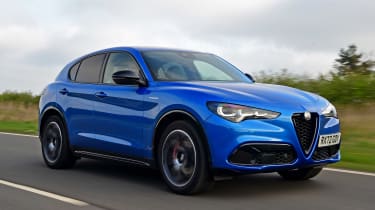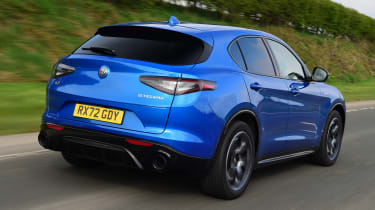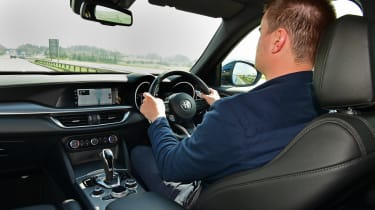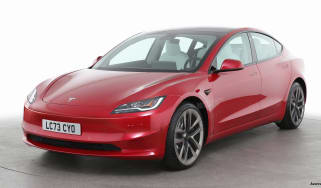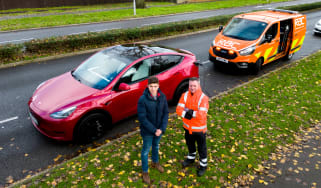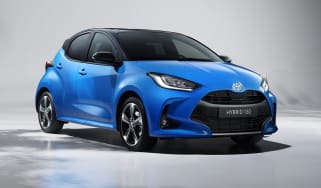New Alfa Romeo Stelvio 2023 review
Updates keep the Alfa Romeo Stelvio SUV competitive with German rivals
Verdict
The mid-life refresh couldn’t really have come any later, because for all the updates, the Stelvio is starting to feel its age in some areas. The interior now lags behind the more recent, smaller Tonale in terms of technology, not to mention its direct rivals from German brands. However, if you want a family-sized SUV that’s both fun to drive and comfortable, the Stelvio should definitely be on your shortlist. It still has enough charm to be appealing.
When Alfa Romeo revealed its first ever SUV, the Stelvio, back in 2016, we found it to be a genuine contender for the established German competition, thanks to its fantastic driving characteristics and easy-on-the-eye design, inside and out.
Fast-forward to 2023 (yes, more than six years later) and Alfa Romeo has given the Stelvio a facelift, alongside the refreshed Giulia saloon, to bring it up to date with the fresher Tonale in its range.
In terms of design, Alfa Romeo clearly feels that less is more, because there are only a few subtle cosmetic changes here. The headlights now feature three individual lights, just like the Tonale, paying homage to the SZ Zagato. The distinctive triangular ‘Trilobo’ grille (as Alfa Romeo calls it) has also been given a new paint finish, plus there’s a new fresh light signature and some extra gloss black trims on the exterior, but otherwise it’s the same old Stelvio – which is to say a rather handsome SUV.
More reviews
Car group tests
In-depth reviews
Road tests
- New Alfa Romeo Stelvio Quadrifoglio 2020 review
- New Alfa Romeo Stelvio 2020 review
- New Alfa Romeo Stelvio Nero Edizione 2019 review
Used car tests
Since this model was first unveiled, we’ve seen new variants of the BMW X3, Porsche Macan and Mercedes GLC, with the last of those vehicles gaining electrified powertrains across the range.
But because it sits on the same Giorgio architecture as the Giulia, the Stelvio has no electrified powertrains to speak of. While company car buyers may be put off by this, it’s worth remembering that the relatively straightforward 2.0-litre turbocharged four-cylinder petrol engine and extensive use of aluminium in the body help keep the Alfa’s weight down to just 1,660kg.
By comparison, a Mercedes GLC 300 tips the scales at 1,925kg and an entry-level, four-cylinder Macan weighs 1,920kg. This relatively low kerbweight means the Stelvio is pretty economical without any hybrid assistance, achieving a respectable 33.2mpg on the combined cycle.
That petrol engine puts out 276bhp and 400Nm of torque, figures that are unchanged for this facelift. There are no major issues here, though; the motor has plenty of punch across the rev range, even if it isn’t the most tuneful Alfa engine ever. As before, there’s an eight-speed automatic gearbox and you can still manually flick through the gears using the brilliant column-mounted aluminium shift paddles, although if you choose not to, it’s perfectly responsive enough in automatic mode. The 0-62mph sprint is dealt with in a fair 5.7 seconds, beating both the similarly priced Macan and GLC by half a second.
The Stelvio’s number-one asset has always been its engaging nature from behind the wheel, and it’s still a great car to drive. It feels just as agile as any of its rivals and the steering is as quick and precise as you can get from an SUV of this size. The Giorgio platform beneath the big body means you can spot the similarities between the Stelvio and the Giulia straight away. The brakes have plenty of stopping power and while we noted they were a bit abrupt on the old model, Alfa Romeo has smoothed out the pedal feel here. Tick that one off as a worthy improvement.
Our test Stelvio was based on the mid-spec Veloce trim level – the one Alfa Romeo expects will account for most of its sales on the Tonale, Giulia and Stelvio. It comes with 20-inch wheels as standard (21-inch rims are a £750 optional extra) and heated sports seats. The latter have rather pinchy side bolsters but otherwise feel premium enough and comfortable. The sidewall on those tyres has plenty of depth to soak up little bumps and ruts in the road. ‘Alfa Synaptic Dynamic Control’ suspension only features on top-spec Competizione trim, but the Veloce’s multi-link rear axle and double-wishbone front-end set-up cope with rough roads just fine. Our only issue with refinement is that road and wind noise aren’t as well damped as in rivals.
There is, of course, Alfa Romeo’s DNA drive-mode selector. The sportiest ‘Dynamic’ setting does what is says on the tin (or on the rotary dial located on the centre console, in this case) by sharpening the throttle, adding weight to the steering and holding on to gears a bit longer.
It’s not a huge departure from the default ‘Natural’ mode, however. ‘Advanced Efficiency’ focuses on safety by making sure the Q4 four-wheel drive system doesn’t lose traction in low-grip environments.
Where the Stelvio loses a few points to its competitors is the interior. We found the array of physical buttons reassuring and ergonomic in these times of complex, large touchscreens, but the Alfa Romeo can’t quite stand up to the usual German cohort in terms of tech and perceived quality.
The 12.3-inch digital dash is an improvement with this facelift, showing three different menu designs: ‘Evolved’ for a traditional readout, ‘Relax’ with minimal information, and ‘Heritage’ for a retro style. An 8.8-inch central touchscreen is standard across the range, but while Alfa’s infotainment is pretty straightforward to use, the screen itself can be laggy at times and the display isn’t very crisp.
Given that it’s a family-friendly SUV, the Stelvio needs to swallow up both passengers and luggage alike. The good news is that there’s plenty of room in the cabin and although rear-seat occupants do sit a little upright, it’s far from uncomfortable. The boot is a little disappointing, however; the Stelvio offers 525 litres of storage compared with the X3’s 550 litres and the 600 litres you get in a GLC.
The price is pretty punchy too, because at £54,240, the Stelvio is just £610 cheaper than a GLC 300 4MATIC AMG Line; and for a premium of barely £1,000, you could land yourself BMW’s plug-in hybrid X3. The diesel options are thirsty, so we think this petrol-powered Veloce is the pick of the updated range so far – that is, until the fire-breathing Quadrifoglio model returns.
| Model: | Alfa Romeo Stelvio Veloce |
| Price: | £54,240 |
| Engine: | 2.0-litre 4cyl turbo petrol |
| Power/torque: | 276bhp/400Nm |
| Transmission: | Eight-speed automatic, four-wheel drive |
| 0-62mph: | 5.7 seconds |
| Top speed: | 143mph |
| Economy: | 33.2mpg |
| CO2: | 192g/km |
| On sale: | Now |

